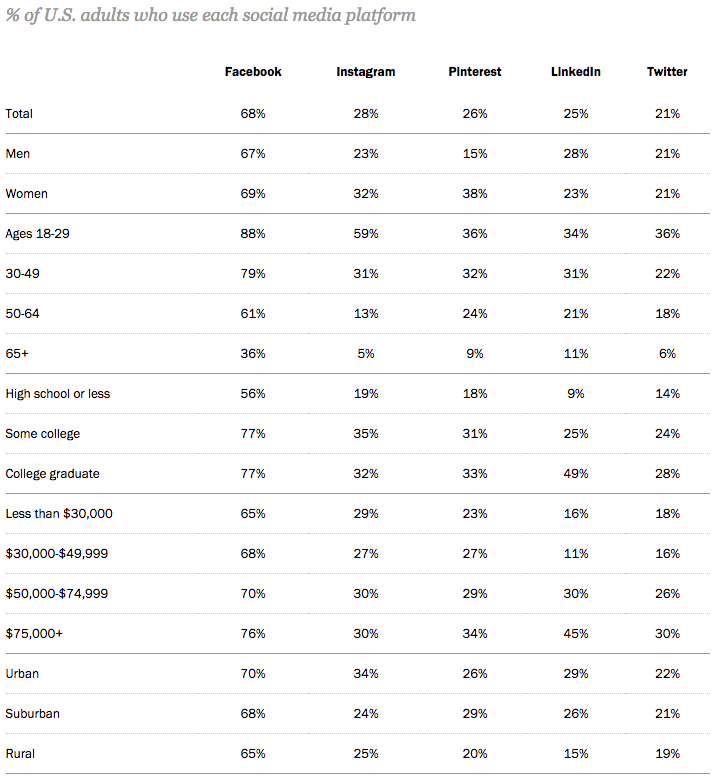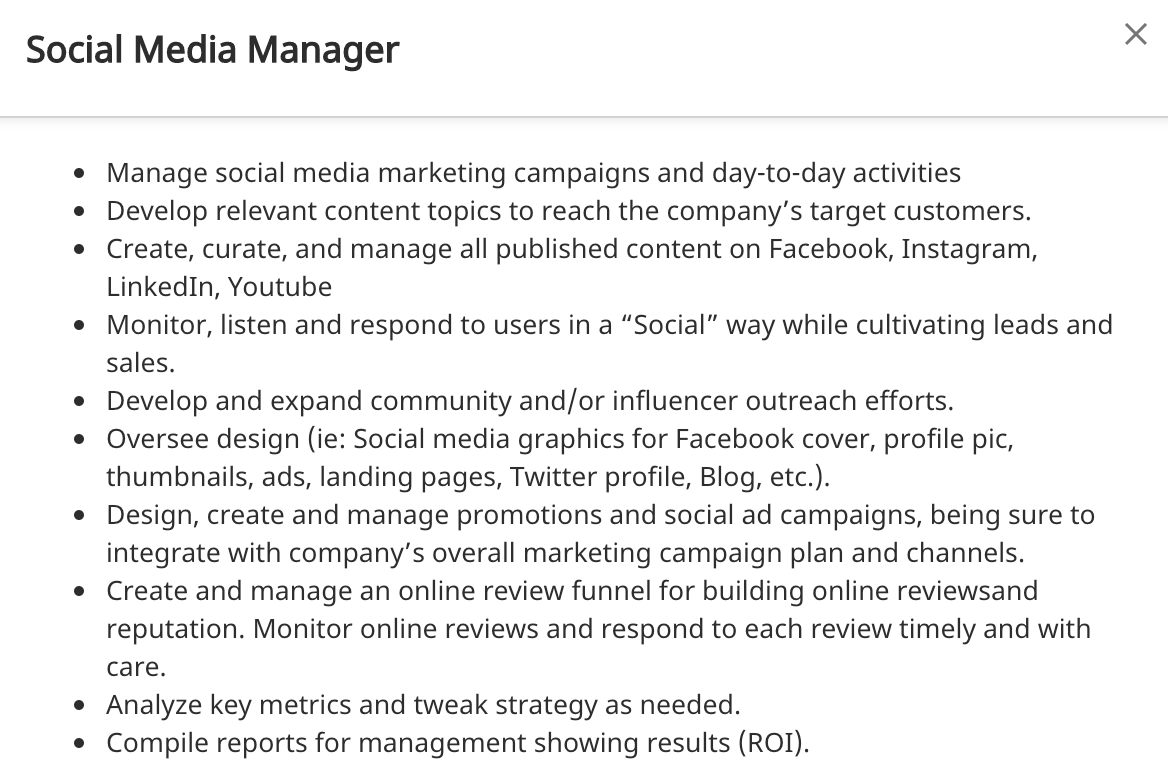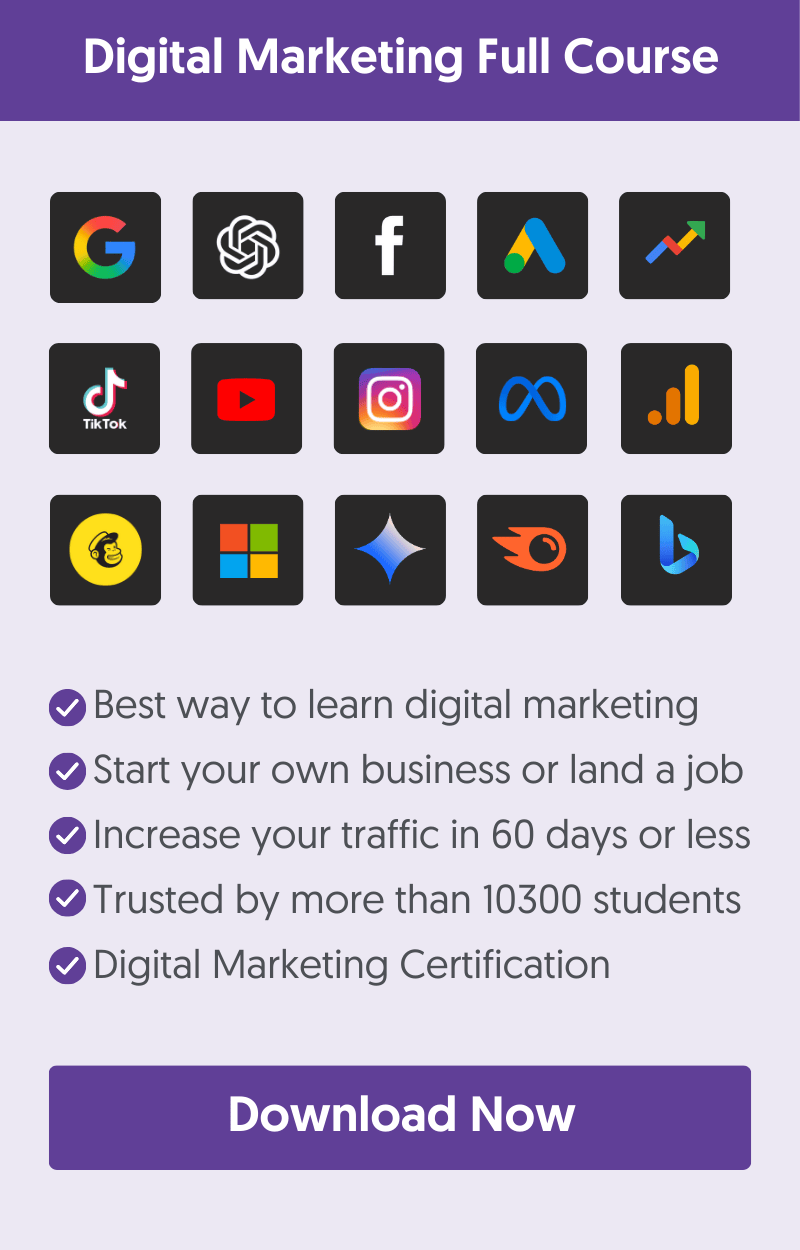When I started my journey to becoming a social media manager over a decade ago, I had no roadmap or experience with social networks. I knew what Facebook and Instagram were but didn't know how to use them for marketing purposes. However, with a willingness to learn, experiment, and adapt, I was able to break into this field and eventually sell social media as a service to my clients.
In this guide, you'll learn how to become a social media manager without experience. You’ll discover what social media managers actually do on a day-to-day basis, the core skills you’ll need to develop, and actionable steps you can take today to start building a portfolio from scratch.
I’ll also cover what you can expect to earn as you grow in this career. Whether transitioning from another job or starting out, this guide will help you find your way into a creative, dynamic, and always-in-demand role.
What Is a Social Media Manager?
A social media manager is responsible for creating and publishing content across social media platforms to enhance a company's online presence and engage with its audience. Their duties include designing social media strategies, analyzing performance, and adjusting tactics to meet engagement and marketing goals.
What Does a Social Media Manager Do?
Social media managers use marketing techniques to manage a brand’s online presence on social networks. Their daily tasks include running social media campaigns to increase followers, creating content, running paid campaigns, reviewing analytics, and creating reports for management.
Other tasks a social media manager does daily include:
- Scheduling posts
- Setting up profiles on social networks
- Creating graphics for social media posts
- Responding to customer inquiries
- Finding relevant content to share
- Optimizing posts for organic reach
- Reporting reach, traffic, and other important metrics to key stakeholders
- Monitoring a brand's online reputation and quickly solving issues affecting the company's image
- Finding and connecting with influencers
- Creating and optimizing paid social media campaigns
What Skills Does a Social Media Manager Need?
Social media managers must develop many skills, including management, copywriting, graphic design, research, strategy, analytics, and communication.
Here are some of the most essential skills you will need to work as a social media manager:
Strategy – Strategic thinking is at the core of social media management. You’ll need to understand how to align social content with your brand’s goals and identify the best platforms and campaign types to maximize reach and engagement.
Analytics – Data-driven decision-making is key to understanding what works and what doesn’t in your social media campaigns. Social media managers must be comfortable analyzing metrics, interpreting trends, and using data to refine content and strategies over time.
Time Management – Social media managers manage multiple accounts and content schedules. Strong time management helps you meet deadlines, respond quickly to comments, and stay on top of each platform’s unique demands.
Copywriting - Social media managers need to write a lot to communicate their brand’s message to their target audience. It is vital to develop your copywriting skills to write concise copy that grabs your audience's attention and elicits an emotional response.
Creativity – Being creative is crucial for capturing your audience’s attention and keeping them engaged with your brand. As a social media manager, creativity will set you apart. While you don’t need advanced graphic design skills, you should be able to think visually and come up with fresh ideas that make your content stand out.
Social monitoring - Social monitoring skills are a big part of being a social media manager, as they allow you to understand your customers' concerns and communicate with them on a deeper level. Customers often have questions, and many tend to turn to social media accounts, either in the comments of posts or direct messaging, to find answers.
Research skills - As a social media manager, you must stay updated with all the news and trends related to social media and the digital world. This will allow you to ensure that your strategy is best suited for success and that you are not missing out on new opportunities.
8 Steps To Become a Social Media Manager With No Experience
- Get a Related Degree
- Learn Social Media Marketing
- Build Your Social Media Experience
- Get An Entry-Level Social Media Job
- Develop Your Manager Skills
- Learn Social Media Marketing Tools
- Build Your Portfolio
- Apply For Social Media Manager Jobs
1. Get a Related Degree
Becoming a social media manager doesn't necessarily require a degree, but getting a bachelor's degree in marketing, communications, public relations, business, or a related field can be very beneficial.
If you don't have a degree, you can get a social media certification from Meta, Coursera, or other companies and demonstrate to potential employers that you have the necessary social media skills and knowledge to work in related positions.
2. Learn Social Media Marketing
Being successful as a social media manager requires constant learning. You need to learn the ins and outs of the different social media platforms.
This means mastering the ability to manage both paid promotions and organic outreach on social media channels.
Paid advertising provides a huge opportunity for businesses to reach their target audience and grow their customer base while earning a high return on their investment.
SEO is also important for social media platforms, as most function as search engines. Knowing how to perform keyword research and structure your social media content can help you reach a highly relevant audience.
The best way to learn social media marketing and gain the skills needed to run both PPC and organic campaigns effectively is to follow a social media marketing course.
A good course will teach you how to run PPC campaigns without wasting your budget and how to design a social media marketing strategy to take advantage of all available social media channels.
Each platform offers a unique user base and works best with different types of content.

The main platforms you will need to master as a social media manager include:
Facebook - Facebook is a wildly popular social media platform with over 3.1 billion active users. Naturally, it has become a prime marketing asset for many businesses. Creating business pages, joining groups, and running paid advertisements are the most common ways to connect and engage with your target audience on the platform.
Instagram - Instagram allows users to post images and short videos accompanied by comments. Nearly half of all Instagram users follow at least one business, and the platform is a popular outlet for learning about brands and products.
LinkedIn - LinkedIn is a social network geared towards professionals. Users focus on business, networking, and high-value and authoritative content like long-form blog posts and thought leadership articles. The user base consists primarily of an older age group, and more professionals are in high-level positions than on any other platform.
X (Twitter) - X isn't as big as Facebook or Instagram, but it is still a great marketing tool. The platform is more popular among millennials and is another go-to choice for people looking to learn about brands and businesses.
Pinterest - Pinterest is another image-based platform that functions similarly to a search engine. People use the platform to learn more about their interests, hobbies, and the products they want to buy. Pinterest's largest demographic is women with higher incomes, and that platform drives a much higher return on investment than other social channels.
3. Build Your Social Media Experience
The best way to develop your experience as a social media manager is through your own profiles. By building a strong online presence, you can use your accounts to display your skills and social media prowess to potential employers.
Whether you plan to work as a freelancer or hold a position with a company, you should create profiles listing your social media services on all the major platforms, including Facebook, Twitter, Pinterest, Instagram, and LinkedIn.
You can use your accounts to experiment with new tactics and gain practical social media experience.
4. Get An Entry-Level Social Media Job
Working as a social media specialist can help you get the experience needed to become a successful social media manager. With relevant social media experience under your belt, it will also be easier to find a job as a manager.
The role of a social media specialist is similar to that of a manager and requires many of the same skills. You will be responsible for leveraging the different social platforms to drive growth for the companies you work for.
This involves researching the target market to decide which platforms present the best opportunities and finding and creating relevant content to share.
As you gain more experience, you will understand how to handle accounts for different types of clients, preparing you to serve as an effective manager in the future.
5. Develop Your Manager Skills
Beyond the industry-specific skills needed to support your social media marketing career, being a manager requires its own set of skills. Some of the important abilities you’ll need to master include:
Communication - As a social media manager, you need to communicate efficiently with clients and your own team. This means being able to articulate your social media strategy and the tactics you will use to reach your goals clearly. Explaining your work can help improve your relationships with clients and ensure your projects go smoothly.
Time management - To manage a successful social media strategy, you need to be able to manage your time effectively. As a social media manager, you must plan and structure campaigns while leading and executing them from start to finish.
Analytical skills - Analyzing data and using it to make more informed decisions is essential to being a social media manager. This allows you to optimize your marketing campaigns, both paid and organic, by focusing on what is working and making changes to what is not.
6. Learn Social Media Marketing Tools
Managing several social media accounts for multiple clients is a complicated process. Fortunately, many tools are available to help you stay organized and streamline the process.
Here are some of the more popular social media marketing tools you’ll want to learn how to use:
Buffer - Buffer is a popular solution that allows you to schedule posts for every social media platform in advance, all from a single dashboard.
This makes it easy to plan and manage all your content, as you can see what you post on each social media channel in a single place. Buffer also provides useful analytics you can use to track the performance of your social media accounts.
HootSuite - Hootsuite is a comprehensive social media management tool that streamlines the process of managing multiple campaigns. Instead of managing each social account in isolation, you can use Hootsuite to oversee them from a single dashboard.
The platform allows you to schedule posts, collaborate with your team, and track messages and conversations.
Sendible - Sendible is a powerful social media management tool for those needing to manage various accounts for multiple clients. It allows you to schedule posts across different social media platforms and can be used to create an editorial calendar for your blog. Sendible also makes it easy to track brand mentions so you can quickly respond to anyone engaging with your brand.
Canva - Canva is a graphic design tool for creating high-quality visual assets for social media channels. It is popular with marketers of all skill levels because it is easy to use even if you have little design experience.
Canva is free to use and offers thousands of design elements for your graphics, along with hundreds of pre-made templates to help you get started.
7. Build Your Portfolio
Once you've gained experience, you should create a portfolio highlighting your work to share with prospective employers.
Gaining a social media manager position relies heavily on showing what you can do and how your skills can benefit a company.
Building your own online presence can help to a degree, but being able to show potential employers the results you have driven for other companies is a powerful way to stand out from the crowd.
Build a portfolio page and write detailed case studies into your projects' success. If you don't have any experience with social media management, you can provide voluntary work to a non-profit or a friend. You could also offer your services to clients at a very low price.
This can help you build some success stories and create a portfolio to add to your resume.
8. Apply For Social Media Manager Jobs

You can work as a social media manager at a company or an agency.
You can use plenty of online job boards to find open social media manager positions. Some popular options include:
- Indeed
- Glassdoor
- ZipRecruiter
- Google for Jobs
- WeWorkRemotely
- AngelList
You can also leverage your network to see if any of your connections can help you secure an open position.
While a college degree is not necessarily required to get a job as a social media manager, it can increase your chances of securing a position significantly. The most popular degrees among social media managers are marketing, communications, or business.
Several social media marketing certifications are also available to help you stand out from the crowd. These include courses from platforms like Facebook, Twitter, and LinkedIn and popular tools like HootSuite.
Social Media Manager Salary
How much do Social Media Managers Make?
The average annual salary of social media managers is between $50,000 and $75,000 per year. The average hourly rate you can earn is anywhere between $15 and $50 per hour. Your salary as a social media manager will vary based on experience and location.

The graph above shows the salary of social media managers in the US based on years of experience.
Key Learnings
Social media experts and managers have various responsibilities, including planning and posting content, connecting with influencers and customers, and monitoring what people say about a brand on the web.
You must learn the ins and outs of each social media platform and the types of audiences that use them. Mastering different social media tools is also essential for planning and managing projects efficiently.
No matter how you start your social media marketing career, you should first build your portfolio. This will help you refine your skills and build your online presence. You can then showcase your abilities to land new clients or get a social media manager position in a company.
Overall, social media marketing will only grow, creating many opportunities for digital marketers to turn their social media skills into meaningful careers.



